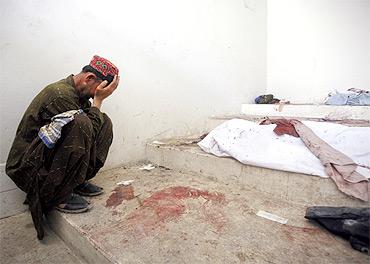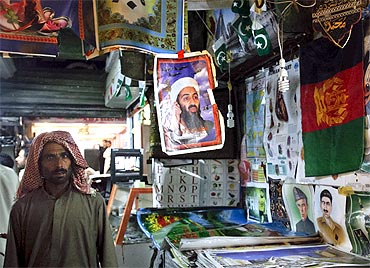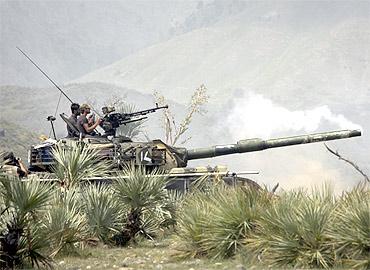
Long before Osama bin Laden was killed, Al Qaeda had adapted itself to survive and operate without him, says Amir Mir
A decade after the 9/11 terror attacks in the United States and the subsequent war on terror launched by the United States-led allied forces against Al Qaeda, the global terrorist organisation continues to pose a serious threat to the world as it keeps thriving in the Pakistan-Afghan tribal belt, having successfully established an effective jihadi network which increasingly exploits its Pakistani affiliates to carry on the global jihadi agenda of Osama bin Laden.
Since former US President George W Bush's declaration of war against global terrorism in September 2001, the US and its allies have claimed to have killed or captured over 75 percent of senior Al Qaeda leaders, the latest being Younis al Mauritania, who is suspected of directing attacks against the US and Europe. He was arrested on September 5 during a raid in Quetta, Pakistan.
Yet, the frequency of Al Qaeda-sponsored terrorist attacks worldwide has increased, as compared to the pre-9/11 period, the latest being the twin suicide attacks on September 7, 2011, targeting the Quetta residence of Deputy Inspector General of the Baluchistan Frontier Corps, which killed 24 people. The attack was carried out in retaliation against the arrest of Younis al Mauritania.

Pakistani security experts say the current spate of high-intensity terrorist attacks, despite bin Laden's killing, makes it obvious that Al Qaeda's core elements are still resilient and the outfit is cultivating stronger operational connections which radiate outward from their hideouts in Pakistan to affiliates scattered throughout the Middle East, North Africa and Europe.
Evidence suggests that Al Qaeda still has thousands of operatives at large across the globe, especially in Pakistan, and its international affiliates are actually stronger now than they were before the 9/11 attacks.
Therefore, Al Qaeda not only remains in business in its traditional stronghold of the Waziristan tribal region in the largely lawless Pak-Afghan tribal belt border, but it as clearly advanced to the urban areas in all four provinces of Pakistan.
But the most worrying aspect of the prevalent situation remains the growing belief of the Barack Obama administration that if there is one country that matters most to the future of Al Qaeda, it is none other than Pakistan.

Al Qaeda, which means 'the base' in Arabic, was founded in 1988 by bin Laden to overthrow the US-dominated world order. The outfit was relatively unknown until the 9/11 terror attacks, when its operatives hijacked four American airliners and crashed two of them into the World Trade Centre towers in New York. They crashed a third plane in the Pentagon building in Washington while a fourth one crashed in Pennsylvania as the passengers attempted to regain control of the plane.
In an exclusive interview with Geo Television on July 23, 2008, Mustafa Abu Yazid alias Sheikh Saeed, then the third senior-most Al Qaeda leader after bin Laden and Dr Ayman Zawahiri, had confessed for the first time that the 9/11 attacks were carried out by 19 Al Qaeda operatives.
As the US-led allied forces launched a ruthless military offensive in Afghanistan in the aftermath of the 9/11 terror attacks, the Afghanistan-based Al Qaeda leadership started systematically moving its fighters across their eastern border into Pakistan, where they effectively took over the rugged and mountainous Federally Administered Tribal Areas, after joining hands with local militants.

The Al Qaeda leadership's choice of using the FATA region, especially the North and the South Waziristan tribal agencies as their hideouts, has enabled the terror outfit to build a new power base, separate from Afghanistan.
As a result, despite Pakistan's extensive contribution to the global war on terror, many questions persist about the extent to which Al Qaeda and its allied groups are operating within Pakistan.
In fact, Al Qaeda's success in forging close ties to Pakistani jihadi groups has given it an increasingly secure haven in the mountainous tribal areas of Pakistan.
Pakistan has replaced Afghanistan as a key state for the training and indoctrination of Al Qaeda recruits for terror operations abroad and training of those indoctrinated and radicalised elsewhere. The international community continues to portray Pakistan as a breeding ground for the Taliban militia and a sanctuary for the fugitive Al Qaeda leaders.

Despite repeated denials by Pakistani authorities, the global media keeps reporting that these terrorists have already established significant bases in Peshawar and Quetta and are carrying out cross-border ambushes against their targets in Afghanistan, while the Al Qaeda suicide bombing teams target the US-led allied forces from their camps in the mountainous region.
The general notion that the Al Qaeda is getting stronger even after a decade-long war against terror can be gauged from the fact that Pakistan, despite being a key US ally during all those years, is undergoing a radical change, moving from the phase of Talibanisation of its society to the Pakistanisation of Al Qaeda.
Many of the key Pakistani Jihadi organisations, which are both anti-American and anti-state, have already joined hands with the Al Qaeda to let loose a reign of terror across Pakistan. The meteoric rise of the Taliban militia in Pakistan, especially after 9/11, has literally pushed the Pakistani state to the brink of civil war, claiming over 35,000 lives in terrorism-related incidents between 2001 and 2011.

The Pakistanisation of Al Qaeda is actually rooted in decades of collaboration between elements of the Pakistani military and intelligence establishments and the extremist Jihadi movements that gave birth to and nurtured Al Qaeda.
The terror outfit has evolved significantly over the years from a close-knit group of Arab Afghans to a trans-national Islamic global insurgency, dominated by more and more Pakistani militants.
American intelligence agencies believe that with a gush of motivated youth flooding towards the realm of jihad and joining the Al Qaeda cadres, Pakistan remains a potential site for recruitment and training of militants.

The fugitive leadership of the outfit keep hiring local recruits with the help of their affiliates in Pakistan, mainly to bolster the manpower of Al Qaeda, which has grown from strength to strength despite the arrest and killing of hundreds of its operatives from within Pakistan since 2001.
In a nutshell, despite the physical elimination of Al Qaeda founder Osama bin Laden almost ten years after the 9/11 attacks, his terror outfit remains a potent threat to global peace.
The death of Osama bin Laden was unquestionably a major blow to Al Qaeda. Yet, there are clear indications to suggest that long before he was killed, Al Qaeda had adapted itself to survive and operate without him, ensuring that the threat his terrorist network poses lives well beyond his demise.
Therefore, there is no reason to believe that the terrorist organisation Osama bin Laden had launched more than two decades ago is anywhere near defeat.